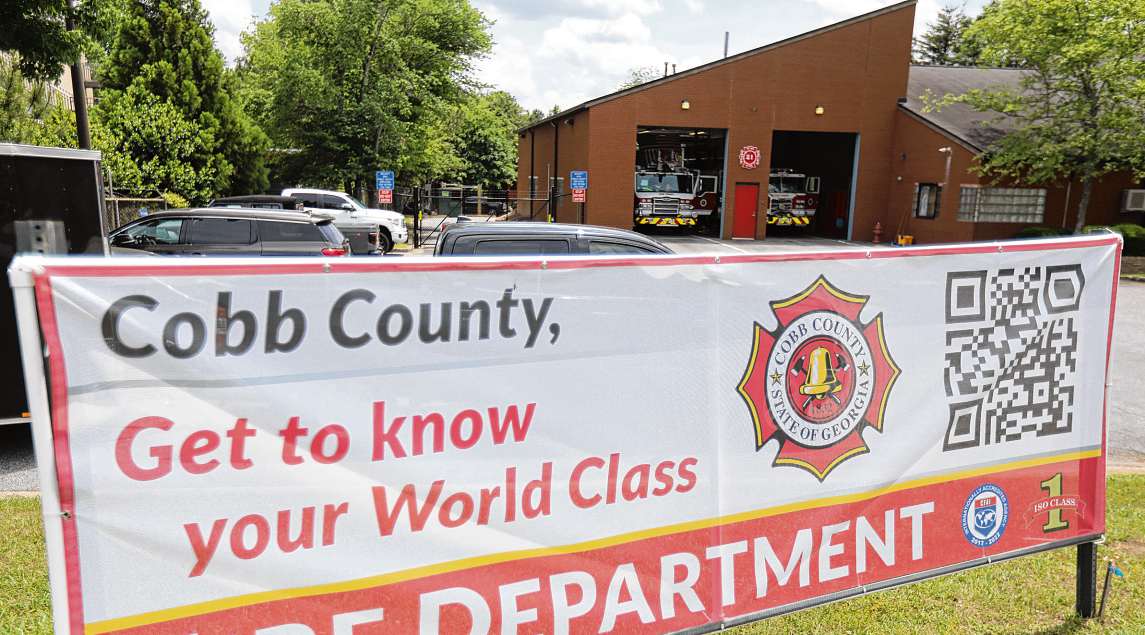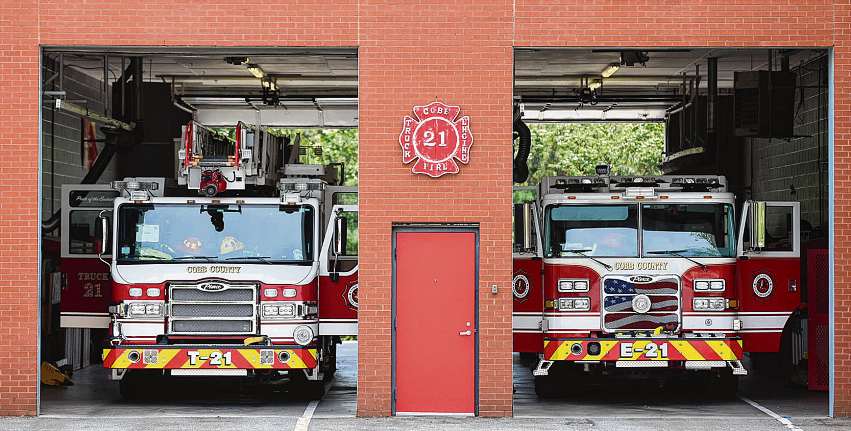
CURTIS COMPTON/AJC 2019


PHOTOS BY MIGUEL MARTINEZ/MIGUEL.MARTINEZJIMENEZ@AJC.COM
COBB COUNTY
For the East Cobb cityhood movement, creating its own fire department is about much more than putting out blazes and rescuing cats from trees.
It’s the only way — on paper — the city could financially support itself without raising property taxes.
According to various drafts of the city’s feasibility study, an East Cobb Fire Department would allow the city to collect more than $14 million in property taxes by taking over a portion of Cobb County’s fire fund, a tax homeowners already pay to the county. Though the county can only spend that revenue on fire services, a city could use it for anything.
East Cobb’s proposed budget relies on that critical revenue boost.
But cityhood opponents say the city budget will still be underwater even with the fire fund revenue because the feasibility study massively underestimates the cost of running a fire department and ignores the difficult process of replicating the county’s fire services without increasing response times.
“It is clear the feasibility study for the Proposed City of East Cobb is completely contrived, underfunding public safety to use those dollars for the city’s general fund,” said Bob Lax, the head of the anti-cityhood group East Cobb Alliance. “Instead of simply admitting that a new city would result in increased taxes, the feasibility study was manipulated to make the city look feasible, to support the outright fabrications that your public safety services will not suffer, and your taxes will not go up.”
County officials are also skeptical.
The feasibility study estimates that East Cobb could run two fire stations already located within the proposed city’s borders for about $5.7 million. But the county’s estimate found the cost would be more than double: $12.4 million.
Cityhood proponents argue their lower estimate is achievable and taxes won’t have to be raised. They also argue fire services won’t suffer and will improve long-term under local control.
“Based on the Georgia State feasibility study and independent financial analysis, it appears that East Cobb presently pays two times more for public safety services than we use today,” said Craig Chapin, president of the East Cobb Cityhood Committee.
“Underfunded and overcharged.
Time for things to change,” cityhood officials wrote on a recent social media post.
Trying to extinguish budget shortfalls
East Cobb, an affluent corner of the county with roughly 50,000 suburbanites, has been the target of cityhood for years.
Last October, Georgia State University completed a draft feasibility study that evaluated how the 25-square-mile community could govern itself if it took over a handful of government services: parks and recreation, planning and zoning, and code enforcement.
Public safety was not on the table.
According to that draft study, which was obtained by Lax through an open records request and provided to The Atlanta Journal-Constitution, the city would not be able to financially support itself by providing only those services.
Georgia State’s researchers found East Cobb would likely have a $3.5 million budget shortfall, which could only be filled by raising property taxes on the would-be city’s homeowners.
The AJC confirmed the authenticity of the draft study.
Avoiding tax increases has been a cornerstone of the cityhood campaign, and subsequent feasibility study drafts focus on trying to plug the revenue gap.
Providing public safety, which includes fire, police and 911 services, ended up being the only practical solution.
The final feasibility study, which was completed in November, found the city’s prospects viable by taking on public safety services and assuming the county’s current 2.86 fire fund millage rate from residents in the proposed city’s boundaries.
Of the four Cobb cityhood efforts on Tuesday’s ballot, East Cobb is the only one vying to provide its own public safety services, meaning it’s the only city that would take over the county’s fire fund taxes for its own use.
The fire fund revenue is vastly more than the feasibility study estimated cost for the city to run its own fire department, which is $5.7 million. As a result, the study found a City of East Cobb would have a budget surplus of $3.1 million. However, if the county’s estimate of $12.4 million to operate the fire department ends up being more accurate, the city would have a multimillion dollar shortfall.
“Cobb County has yet to disclose the complete and accurate picture of the operating costs of Cobb Fire Stations 15 & 21,” Chapin said. “Absent complete and accurate information from the county, we cannot comment on the specifics of incidents.”
The two sides disagree on how fire costs should be calculated.
The feasibility study looked at multiple metro Atlanta cities comparable to East Cobb’s size, but it omitted Marietta, which spends more than $14 million annually to run its fire department.
East Cobb Cityhood argues its $5.7 million figure includes the purchase of the two existing fire stations and all of their trucks and equipment, citing state law that would force the county to sell the stations for $5,000 apiece.
However, Lax argues firetrucks and equipment would not be included under state law and could cost several million dollars extra.
A county spokesman said Cobb’s legal department is researching the issue.
“I think people are getting misled into creating a city that’s actually going to cost them more money than they expect,” Lax said, “and at the end of the day, they’re going to get less services for that.”
Longer response times The other issue being debated is whether a city fire department would be able to match the services currently provided by the county.
On its website, East Cobb Cityhood said improving fire service is not a goal, but the city will aim to match the area’s current level of service. County officials say that’ll be a tough task.
The county generated expected fire response times throughout the East Cobb area and released maps showing that a city-run fire department would be slower in many areas, primarily along the city’s western border, which is served by a station not in the proposed city. Response times in several neighborhoods would take twice as long, while no homes would get faster response times, according to the county’s estimates.
“We are not running a campaign for or against any of the cityhoods,” county spokesman Ross Cavitt said, adding that the estimates were generated to answer constituent questions.
The East Cobb area is currently served by more than two dozen firefighters from stations outside the proposed city limits, and a new city would have to enter into a mutual aid agreement to preserve that network. The county’s response time estimates do not account for outside assistance.
Cityhood proponents say the agreement will be an easy deal to make, but Deputy Fire Chief Mike Schutz said at a recent town hall that it would not be automatic.
“It’s whatever is agreed upon at the time, so I can’t say that, ‘Yes, we would respond into the city,’ without the (mutual aid) agreement being vetted and signed,” Schutz said. “And that would have to happen after the city would come to fruition.”
The county also cites the department’s top ISO (Insurance Services Office) rating, which is a factor insurance companies use when calculating premiums.
“A newly-created two-station fire department in the proposed city would not enjoy a top ISO rating, which could affect home and business insurance rates,” the county said on its cityhood information website.
South Fulton is the only metro Atlanta city founded in the past decade that’s managed to obtain a top ISO rating for its fire department.
East Cobb Cityhood waves away this concern by saying some insurance companies, such as State Farm, do not incorporate ISO ratings into their home insurance rates.
Lax said he can’t see how a newly founded city would be able to improve public safety services while also pinching pennies to cover the rest of the city’s bills.
“Our public services are very good today,” Lax said. “I don’t know how we’re going to replicate them for the cost that we’re proposing.”